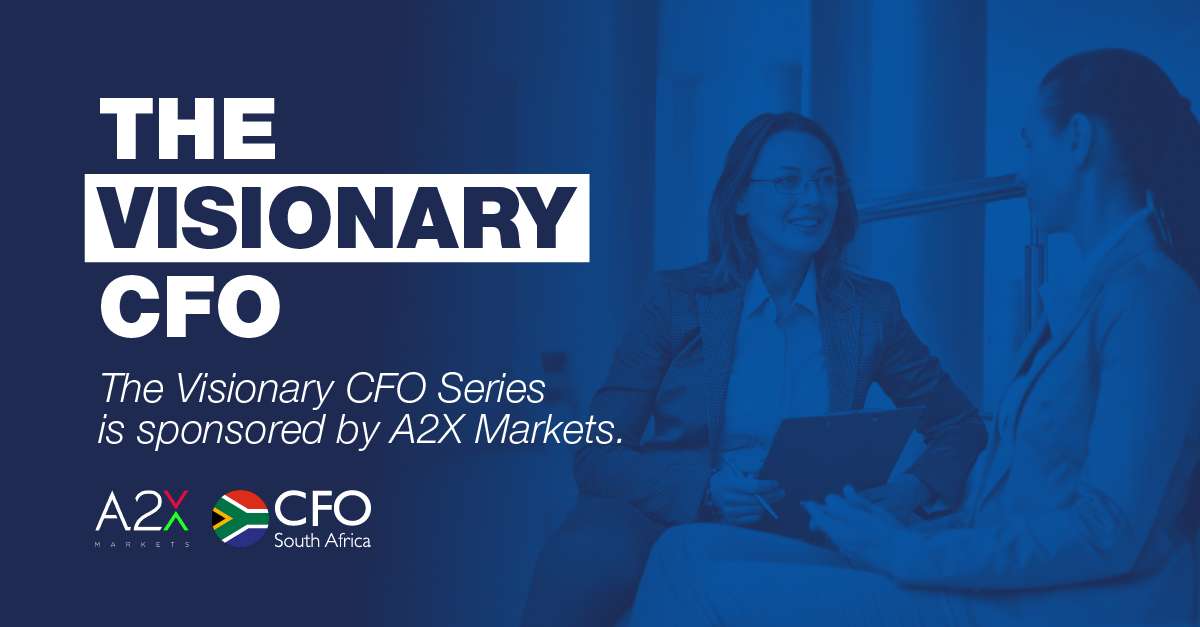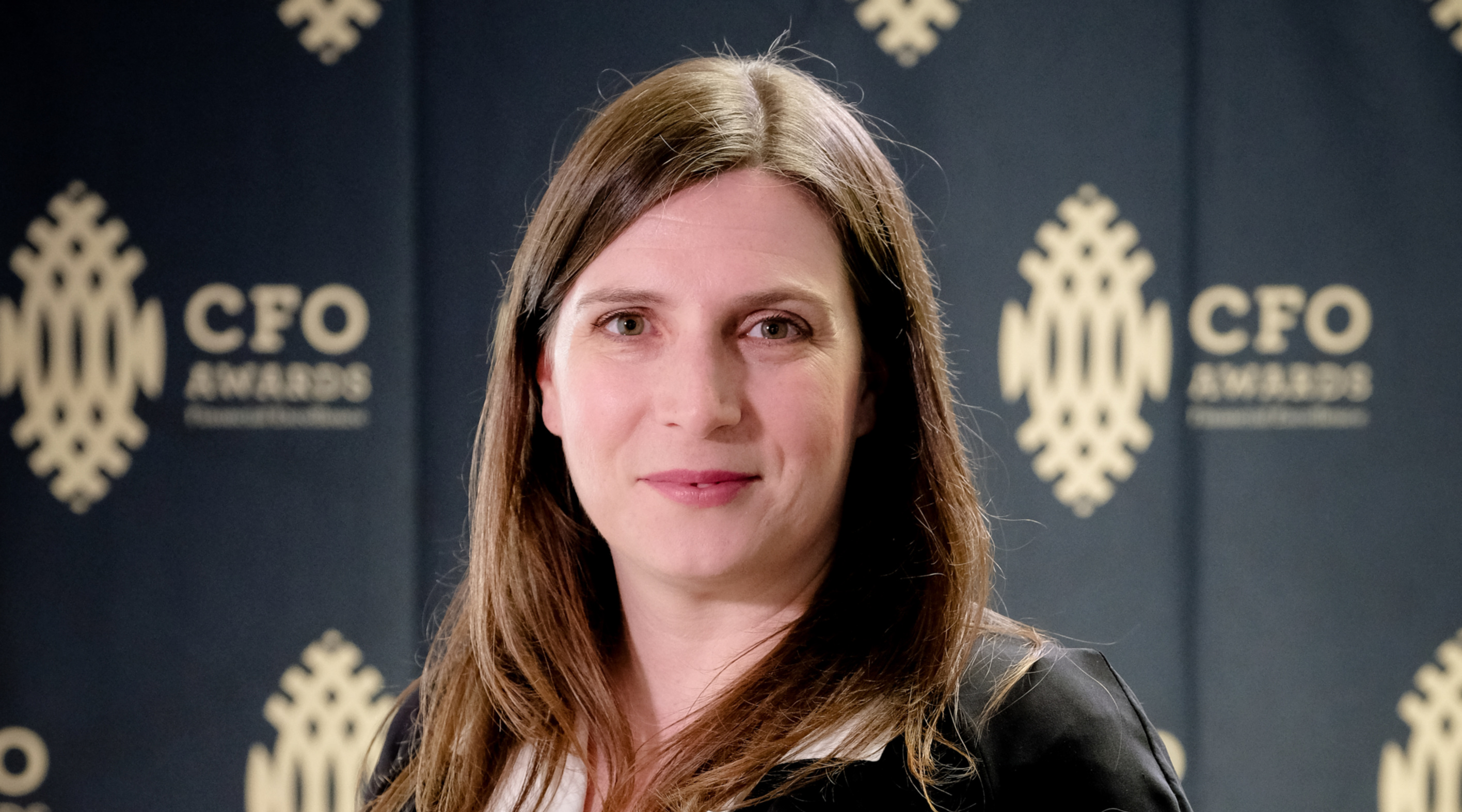After navigating the Covid-19 risks, CFO Mike Davis is now focused on Nedbank's green and sustainable future.
Mike Davis has had an interesting career trajectory – often navigating corporate mergers, but then finding his place and holding a significant role in the new entity. His journey of change and success got him to where he is today – in the role of CFO of Nedbank.
From articles at Deloitte’s Durban office, Mike moved to one of his biggest clients, NBS, in the risk space. He describes his time there as offering great experience, before the company went on to merge with Boland to become NBS Boland. This then merged with BOE Investment and Private Bank to become BOE Bank, which was then bought by Nedbank in 2002.
This necessitated a move up to Johannesburg, but at the time, Mike’s wife Kerry was five months pregnant with their first child. He asked her what she thought we should do. “We’ve got to go,” she responded. So they relocated to Johannesburg, where they have stayed for the last 19 years.
|
On the back of a successful Visionary CFO Series in 2021 and 2022, A2X has once again partnered with CFO South Africa to bring you a series of interviews highlighting South Africa’s best and brightest CFOs, their insights and challenges. Find out how they help lead some of South Africa’s most successful companies in this bi-weekly interview series. |
“I moved straight into 135 Rivonia Road, and with the acquisition, we were now merging Nedbank, Nedbank Investment Bank, Cape of Good Hope and all of the BOE Bank Brands and Businesses.”
With the move to Joburg, Mike says as expected that there were multiple resources competing for the same role within Nedbank. “There was more than one Mike Davis competing for the asset and liability management role within the merger, but to cut a long story short, I was successful in securing the role. That then extended to incorporate capital management, which was then the start of an entity within the business called balance sheet management, which really sits between group finance, group treasury and group risk.”
After a while, Mike ended up as head of balance sheet management, and moved onto group exco in 2015.
“Subsequent to that, my role in balance sheet management shifted from reporting to the chief operating officer to the CFO, where I then reported to Raisibe [Morathi]. Shortly thereafter she decided to pursue new opportunities. After 10 years at Nedbank, as she felt she needed a change – and the opportunity to apply for a new role came up. Again, I was fortunate to be successful in securing the role of chief financial officer. I don’t take this lightly, underestimate it or take it for granted.”
Mike acknowledges that he’s been fortunate to learn a lot and successfully navigate a number of big business changes in his career. “I have enjoyed the path that I’ve taken. I know it’s quite unusual with multiple mergers and acquisitions. I’ve always been close to the migration or the transition as we’ve reshaped the business after each of these mergers, which does create opportunity but also challenges. Things change all the time, and I have certainly been lucky to do well through most of these changes, and I’ve learnt a heck of a lot.”
Covid-19
There has also been a lot to learn as the Covid-19 pandemic took hold in South Africa. As the country went into lockdown level 5 in March and April last year, Nedbank quickly enabled 77 percent of their campus staff to work from home. And then they faced the risk challenges that the pandemic brought.
“The crisis played through a number of bank risk types – increased volatility, translated quite quickly into higher levels of market risk and operational risk, then into potential industry-wide liquidity risk followed by solvency considerations. Some of our clients felt the need to draw down on unutilised credit facilities in the short term, placing this cash back on deposit with the bank which then had a consequential impact on our liquidity profile. As corporates or clients default, or the likelihood of default increases this then migrates into increased credit risk and higher levels of impairments, which adversely impacts on bank solvency. In my position I was front and centre in dealing with all these risks as they emerged.”
In September, Mike moved into the acting CFO role, and when Raisibe left on 1 October, he was officially appointed as CFO. “I don’t know if that was a good or a bad time to be appointed. The markets and banking activities were extremely volatile and unusual. We were looking at how best to support our staff and keep them safe, and how to service our clients. We were trying to predict how Covid might play out. So there was a lot of pressure in the timing of accepting my new role, but I was extremely pleased to get the job.”
He says that the timing of the pandemic was fortunate for banks, in that the digital progress made by the South African banking system allowing clients to engage digitally was widespread.
“Certainly, in terms of pivoting from the perspective of how best to service our clients, we were fortunate as an industry because of the significant digital progress we have made over the past five to six years. We had a fundamental shift in strategy at Nedbank. We had to focus on being resilient in the context of an environment where we weren’t sure how things were going to play out. We focused on ensuring balance sheet resilience through strong levels of capital and liquidity and ensuring that we were well provided for potential losses with strong levels of provisioning and coverage. This is so important as the strength of the balance sheet speaks to the resilience of the franchise and the ability to generate long-term sustainable growth versus short-term profitability.”
Getting on track
While Nedbank has its own contingency and sustainability plans, Mike makes some very important observations about the necessary improvements for the country and economy at large. One is that there needs to be accelerated structural reform, such as has been seen in the self-generation of electricity space.
“Any company can now generate or source their own electricity up to 100MW without having to be licensed – that’s significant for corporate South Africa. It enables our corporate clients to build their own energy security in terms of production for whatever they do. It’s an example of a really positive development in the structural reform space.”
Mike adds that another positive step has been the framework that has been developed around wheeling – which means purchasing renewable energy from resources not directly plumbed into your own business. “So you can secure power from a windfarm 500km away, as long as it plugs into the Eskom grid. Under the wheeling agreement, renewable energy is delivered into the grid from the windfarm supported by your corporate offtake of such power.”
It is through an arrangement like this that Mike says they are planning to make Nedbank’s head office at 135 Rivonia Road that currently constitutes 20 percent of the operations’ energy use, approximately 80 percent green in due course. “We just don’t have the roof space to do it at the campus, but wheeling allows us to secure green energy to the site, and then ultimately to all of our campus sites as well.”
Another issue that Mike says needs to be addressed is policy certainty. The concerns and uncertainty around, for example land expropriation without compensation make it hard to get investment from foreign markets. “If government can deliver policy certainty, then we have an opportunity to get higher levels of fixed investment, which talks to long-term sustainable growth. This then talks to lower levels of unemployment.”
The third issue that needs to be addressed in South Africa, according to Mike, is that the market needs to be convinced of the rule of law. “In the wake of the recent looting and unrest during July, this rests squarely with government to reassure all of us that our citizens, investors and visitors are safe and that their assets are secure.”
The green bank
Nedbank has a strong focus in the energy space, with a view that it wants to lead the market. In line with this commitment Nedbank put two resolutions to shareholders last year that received 100 percent support.
“The first one was related to our commitment to adopting and disclosing an integrated energy policy, which we’ve now done, and what is very important to us is to get the balance right in transitioning away from fossil fuel to green energy, while supporting our existing clients and the national grid – because if the national grid fails, there will be no energy in the short to medium term. It has to be a just transition – we cannot migrate from one to the other immediately.”
To this end, they have mapped out a very clear timeline for the migration away from the financing of thermal coal with higher levels of financing into renewable resources, that distinguishes between the various timelines, between exploration and production, upstream and downstream, and the provision of funding for new coal mines versus provisions for existing timelines. “This is all mapped out in a very clear timeline and in line with a just transition.”
The second relates to reporting on our approach to measuring, disclosing and assessing our financial exposure to climate-related risks on which we continue to make progress through our integrated reporting.
Nedbank’s exco decided to navigate this transition under the sustainable development goals (SDG) banner, which is well recognised globally and well articulated. Mike is responsible for driving momentum for SDG 7 – the provision of affordable and clean energy. “By way of example, we are looking at maintaining our dominant position in the financing of renewable energy projects, increasing funding for embedded energy projects, giving high levels of funding to hybrid and electric vehicles, and encouraging clients to take out refinance to retrofit solar panels onto their roofs and buy solar powered geysers. That’s my objective around SDG 7 – to look at climate change and to look at the immediate consequence of what’s happening on the planet.”
He adds:
“We don’t just say we’re the green bank, we really stand behind it. It’s something we can demonstrate credentials in and we believe we have an important role to play towards moving South Africa towards renewable energy alternatives.”
Family life
A focus on sustainability underpins Mike’s views as the CFO of Nedbank, but he feels equally strongly about them as a citizen of the world and a father. His first child, a daughter – Kennedy, is 18. His sons Weston and Dean are 16 and 13. Although Joburg wasn’t planned to be any of the children’s birthplace, Mike says the city has been good to his family. “It has a really lovely vibe and a great energy when it comes to business. It’s cosmopolitan and has a lot going for it.”
He says that in many ways, lockdown was about “getting on with it”. His children were old enough to focus on their schoolwork, and Mike was very caught up in his new responsibilities, but it was still very important to him to play his part – at work and at home. “It is important for me to play my part at Nedbank, for our people and our clients, but also for my family. I think we are hopefully through the worst of it now.”
Mike and Kerry are avid mountain bikers, often competing in events together, and both enjoy pretty much any outdoor sport. Mike and his three children also play horse polo, often participating in tournaments together, which allow them to spend their whole weekends together. Kerry also rides and is a great supporter of her family’s polo endeavours.












